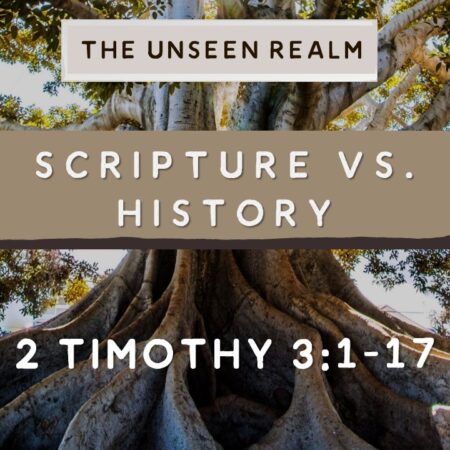2 Timothy 3:1-17
Genesis 12:1-7; Genesis 14:1-7; Genesis 14:18-23;
Exodus 3:13-15; Exodus 2:11-15
Acts 7:22
2 Timothy 3:8-9; 2 Timothy 3:1-8
As Bible believing Christians, or what scholars call ORTHODOX CHRISTIANITY, we believe in SOLA SCRIPTURA, that is: Scripture alone is the primary and absolute source for all doctrine and practice (faith and morals). But notice this quote says: “SOURCE OF ALL DOCTRINE AND PRACTICE”, not “Source of all facts whatsoever.”
Word Study
• רפאים Rephaim The word Rephaim means “terrible ones” and they are described in the Bible as “giants” and “mighty men.”
• “Like the Anakim they are also counted as Rephaim, but the Moabites call them Emim.” (Deuteronomy 2:11)
• אימים EMIM The word Emim is derived from the Hebrew word Eima which means “terror or fear”
• “Rephaim formerly lived there–but the Ammonites call them Zamzummim.” (Deuteronomy 2: 20)
• זמזומים Zamzummim The word Zamzummim comes from the Hebrew word Zimzum which means ‘buzz’ or ‘hum’ and describes the characteristic noise they produced which is strongly associated with the ancient belief of the noise the spirits of the dead.
In context, knowing God’s name means knowing his identity.
In other words, Scripture vs historyGreat Books of the Western World is a series of books originally published in the United States in 1952, by Encyclopædia Britannica, Inc., to present the great books in a 54-volume set. “The original editors had three criteria for including a book in the series drawn from Western Civilization: the book must have been relevant to contemporary matters, and not only important in its historical context; it must be rewarding to re-read repeatedly with respect to liberal education; and it must be a part of “the great conversation about the great ideas”, relevant to at least 25 of the 102 “Great Ideas”.
In Volume 14 we find the Roman historian Tacitus describing what he has heard about Moses and the Exodus.
Tacitus, Histories 5.3-4
“Most writers, however, agree in stating that once a disease, which horribly disfigured the body, broke out over Egypt; that king Bocchoris, seeking a remedy, consulted the oracle of Hammon, and was bidden to cleanse
his realm, and to convey into some foreign land this race detested by the gods. The people, who had been collected after diligent search, finding themselves left in a desert, sat for the most part in a stupor of grief, till one of the exiles, Moses by name, warned them not to look for any relief from God or man, forsaken as they were of both, but to truest to themselves, taking for their heaven-sent leader that man who should first help them to be quit of their present misery.
They agreed, and in utter ignorance began to advance at random. Nothing, however, distressed them so much as the scarcity of water, and they had sunk ready to perish in all directions over the plain, when a herd of wild asses was seen to retire from their pasture to a rock shaded by trees. Moses followed them, and guided by the appearance of a grassy spot, discovered an abundant spring of water, This furnished relief. After a continuous journey for six days, on the seventh they possessed themselves of a country, from which they expelled the inhabitants, and in which they founded a city and a temple.
Moses, wishing to secure for the future his authority over the nation, gave them a novel form of worship, opposed to all that is practiced by other men. Things sacred with us, with them have no sanctity, while they allow what with us is forbidden. In their holy place they have consecrated an image of the animal by whose guidance they found deliverance from their long and thirsty wanderings. They slay the ram, seemingly in derision Hammon, and they sacrifice the ox, because the Egyptians worship it as Apis.”

